Friday, April 11,2025. Annette’s Roundup for Democracy.
Yale Professor Timothy Snyder provides a new, accurate, and important analysis of how the deranged man in the White House functions.
Trump's Psychological Vulnerability And the Destruction of the American Economy

Trump has an obvious weakness that makes America weak. He places the American economy at risk for the sake of a personal foible, a visible vulnerability.
All his adult life, Trump has been ripping people off. That is his modus operandi. Rather than a conscience, he has the habit of displacement. It is not that he is ripping people off. Everyone else is ripping him off.
As he has aged this has grown into an vulnerability. He actually seems to believe that everyone is ripping him off. He makes no distinction between himself and the government. And he has no grasp of how any significant policy actually works. This means that anyone who has access to him and understands his vulnerability can generate a self-destructive American policy.
An easy example of this, before the tariffs, was Ukraine. Somewhere Trump got the idea that Ukraine was ripping off the United States. And once the idea was in his head, he was its slave. He kept repeating that the Ukraine owed the United States $350 billion.
This made no sense. The assistance in question was aid, not a loan. The value of the aid was about a third of what Trump claimed. Most of the military aid came in the form of spending inside the United States. And of course the Ukrainians have paid. They have fulfilled the entire NATO mission by themselves in holding off a Russian attack. They have suffered enormous losses of all kinds. And they have shared intelligence and innovations with the United States. But none of that matters to Trump. Once he is told that he is being ripped off, he is helpless, and others must suffer.
We don't know now, though it is not hard to guess, who told Trump that Ukraine was ripping him off. The Russians have a keen sense of psychological vulnerabilities, and they have been paying close attention to Trump for a long time.
Trump also cites the made-up number of $350 billion to justify tariffs. He claims that Europeans, curiously, somehow "owe" the United States that exact same amount. Trump believes that if Americans buy more from another country than residents of that country buy from us, that is a loss, that he personally is somehow being ripped off. And so when the United States formulated tariffs on the whole world last week, the operating principle was that all trade deficits -- cases where we buy more than we sell -- should be eliminated.
This is nonsensical. There is no state of nature where countries buy and sell the exact same amount from one another.
Imagine a party where people are freely talking to each other. Then someone jumps up on a table and insists that in every conversation each speaker should use the exact same number of words as the person with whom he or she is in dialogue. What would happen then? Every conversation would grind to a halt, because an artificial planned equality of words is not how conversations work. An artificial planned equality of the value of imports and exports is, by the same token, not how trade works.
There is a much injustice in international trade. And there is much to be said for a thoughtful trade policy that protects or encourages certain industries. Manufacturing is of inherent value. But none of this will arise from the hurt feelings of an oligarchical president.
Because Trump's policy is based on personal vulnerability, it is erratic. If someone makes him feel more vulnerable than he was already, he will stop. He will not, for example, impose tariffs on Russia, because he is afraid of Russia. On the other hand, if someone convinces him that he has won, then he will also reduce the tariffs, as has just happened. If he no longer feels that he is being ripped off, then he yields. Until the moment when his feelings change.
To a person which such a obvious vulnerability, everything seems out of control. And so control is the only answer. Everyone is acting to rip me off. And so I must establish control by calling them all out, and making them deal with me from a position of weakness and ridicule. And so now the United States -- so goes the theory - will now negotiate individually with every single country of the world. We have broken agreements with many of them, and now we will sign new agreements, which will probably be worse: we lack time now, and patience, and focus. And we can never get back the trust of our closest trade partners.
The same is true in domestic policy. By establishing the tariffs, Trump thinks that he is creating leverage for himself against American companies. They will all have to come to him personally to seek the "carve-out," the exception, that will allow them to continue to trade in world markets and function as they had before. And so Trump can enjoy feeling less vulnerable as he tries to bully companies. But this amounts to central planning, and of a particularly irrational sort: one that depends upon one man's feelings. Investing inside the United States no longer means what it once did. And this will not quickly change.
We all have our foibles, our whims, our vulnerabilities. But when one person has unchecked power, irrationality becomes unchecked. Donald Trump thinks that everyone is always ripping him off. If he were the president in a normal situation, this would be a minor problem. But in a situation in which he has gotten away with an attempted coup, in which the Supreme Court has told him he is immune from prosecution, in which members of his own party rarely challenge him, in which Congress no longer sees the need to pass laws, and so on, in which too much of the media normalizes him, Trump's vulnerability can bring about the destruction of the country.
We have thousands of years of political theory and indeed great literature to instruct us on this point: too much power brings out the worst in people -- especially among the worst of people. As the founders understood, the purpose of the rule of law, of checks and balances, of regular elections, is to prevent precisely such a situation.
Allowing our republic to be compromised has many costs, for example to our rights, and to our dignity. But it also has costs in a very basic economic sense. When you elevate the mad king, you elevate the madness. (Substack).
Here is another example of the madness that Snyder describes.👇 it happened today.
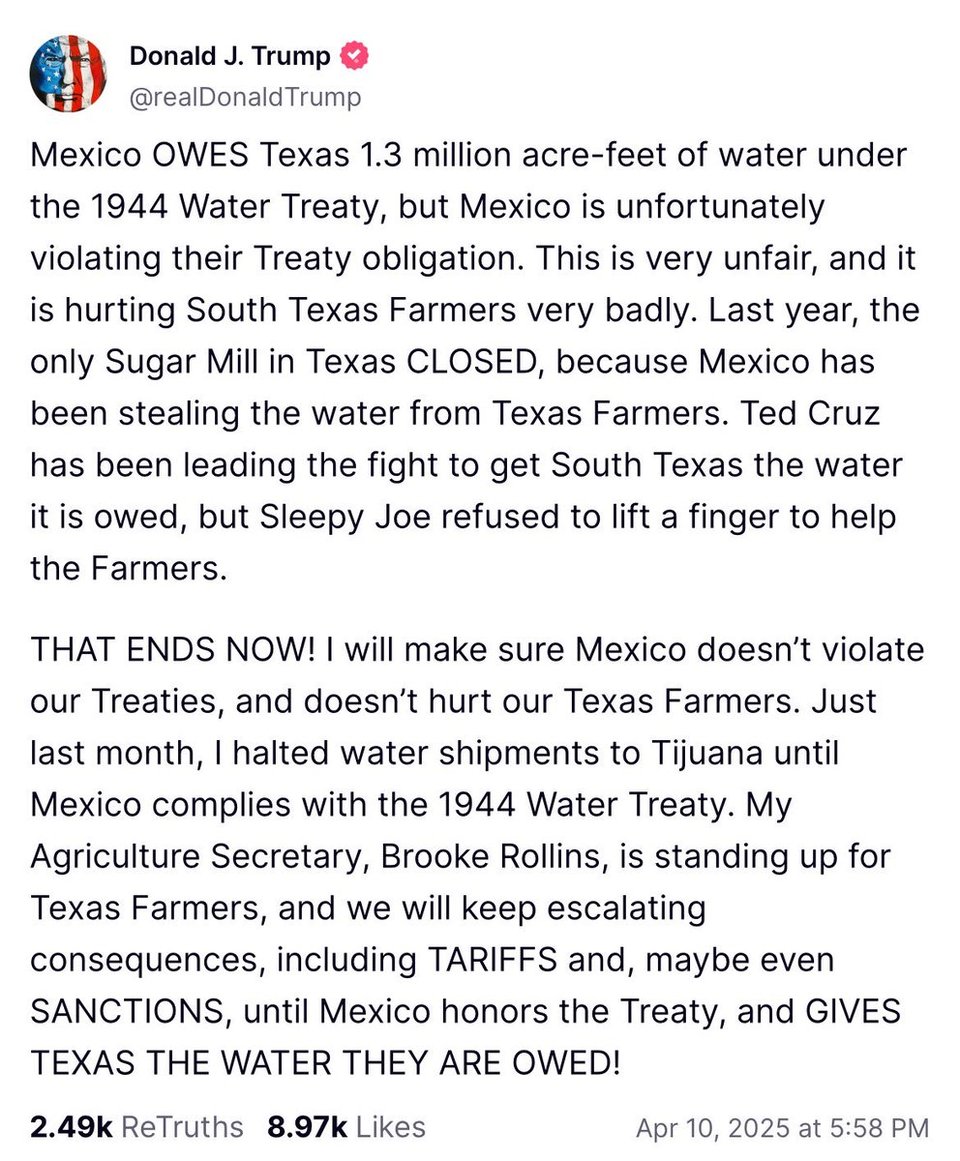
This is not what Professor Snyder discusses, but it is another Trump illness. 👇
Trump Is now commanding His Cabinet and Loyalists including Senators and Congresspeople to Wear ‘the Trump Golden Bust’ instead of American Flag pins.
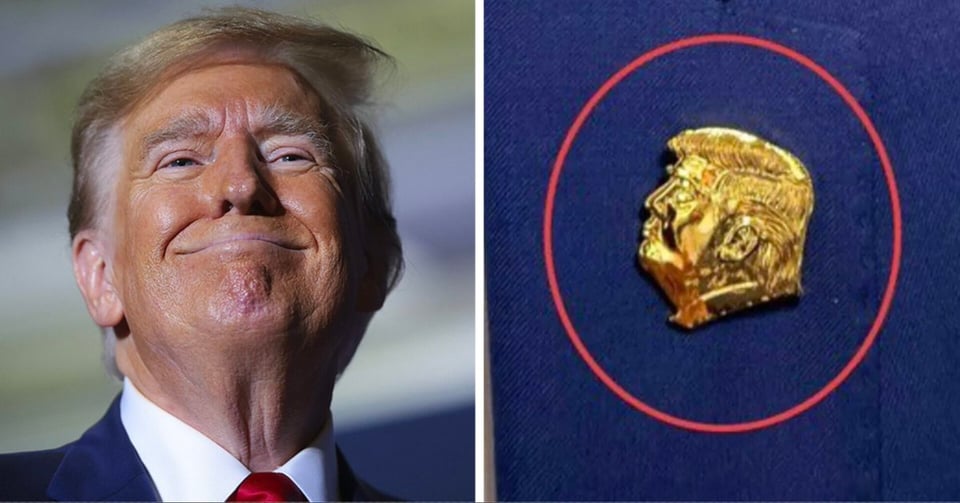
FCC Chair Brendan Carr sports a gold Trump-head lapel pin.
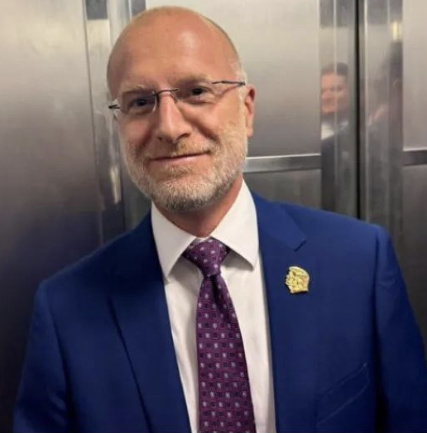
In the same spirit.👇
On display at Mar-a-Lago: A golden Mount Rushmore monument with Trump head on it pic.twitter.com/SqGPO5Aqaj
— PatriotTakes 🇺🇸 (@patriottakes) March 16, 2025
Yesterday, in a 9-0 ruling, the Supreme Court required the Trump administration to "facilitate" the return of Kilmar Abrego Garcia.

KRISTI NOEM, SECRETARY, DEPARTMENT OF
HOMELAND SECURITY, ET AL. v. KILMAR
ARMANDO ABREGO GARCIA, ET AL.
Read the ruling. 👇
The 9-0 Supreme Court Ruling.
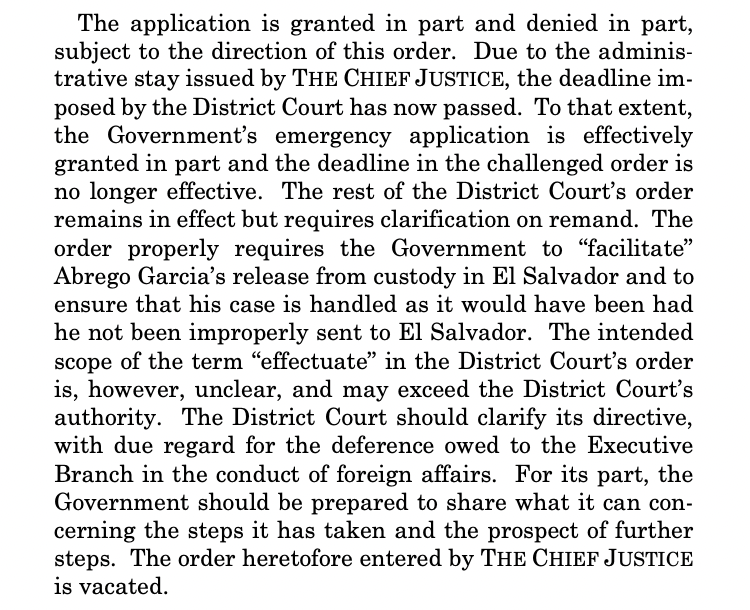

Jennifer Stefania Vasquez Sura, second from right, during a demonstration in support of her husband, Kilmar Armando Abrego Garcia, in Greenbelt, Md., last week. Mr. Abrego Garcia’s lawyers have called his deportation “a Kafka-esque mistake.”
The Supreme Court on Thursday instructed the government to take steps to return a Salvadoran migrant it had wrongly deported to a notorious prison in El Salvador.
In an unsigned order, the court stopped short of ordering the return of the migrant, Kilmar Armando Abrego Garcia, indicating that courts may not have the power to require the executive branch to do so.
But the court endorsed part of a trial judge’s order that had required the government to “facilitate and effectuate the return” of Mr. Abrego Garcia.
“The order properly requires the government to ‘facilitate’ Abrego Garcia’s release from custody in El Salvador and to ensure that his case is handled as it would have been had he not been improperly sent to El Salvador,” the Supreme Court’s ruling said. “The intended scope of the term ‘effectuate’ in the district court’s order is, however, unclear, and may exceed the district court’s authority.”
The case will now return to the trial court, and it is not clear whether and when Mr. Abrego Garcia will be returned to the United States.
“The district court should clarify its directive, with due regard for the deference owed to the executive branch in the conduct of foreign affairs,” the Supreme Court’s ruling said. “For its part, the government should be prepared to share what it can concerning the steps it has taken and the prospect of further steps.”
The ruling appeared to be unanimous. But Justice Sonia Sotomayor, joined by Justices Elena Kagan and Ketanji Brown Jackson, issued a statement that was harshly critical of the government’s conduct and said she would have upheld every part of the trial judge’s order.
“To this day,” Justice Sotomayor wrote, “the government has cited no basis in law for Abrego Garcia’s warrantless arrest, his removal to El Salvador or his confinement in a Salvadoran prison. Nor could it.”
Justice Sotomayor urged the trial judge, Paula Xinis of the Federal District Court in Maryland, to “continue to ensure that the government lives up to its obligations to follow the law.”
A Justice Department spokesman responded to the order by focusing on its reference to the executive branch.
“As the Supreme Court correctly recognized, it is the exclusive prerogative of the president to conduct foreign affairs,” the spokesman said. “By directly noting the deference owed to the executive branch, this ruling once again illustrates that activist judges do not have the jurisdiction to seize control of the president’s authority to conduct foreign policy.”
Andrew J. Rossman, one of Mr. Abrego Garcia’s lawyers, expressed satisfaction with the Supreme Court’s action.
“The rule of law won today,” he said. “Time to bring him home.”
Mr. Abrego Garcia’s wife described the effect the case has had on their family and said she would keep pursuing his return to the United States. (New York Times).
The founder of the Democratic Fund-Raising Juggernaut, Oath, explains why your donation counts, especially when you make it early.
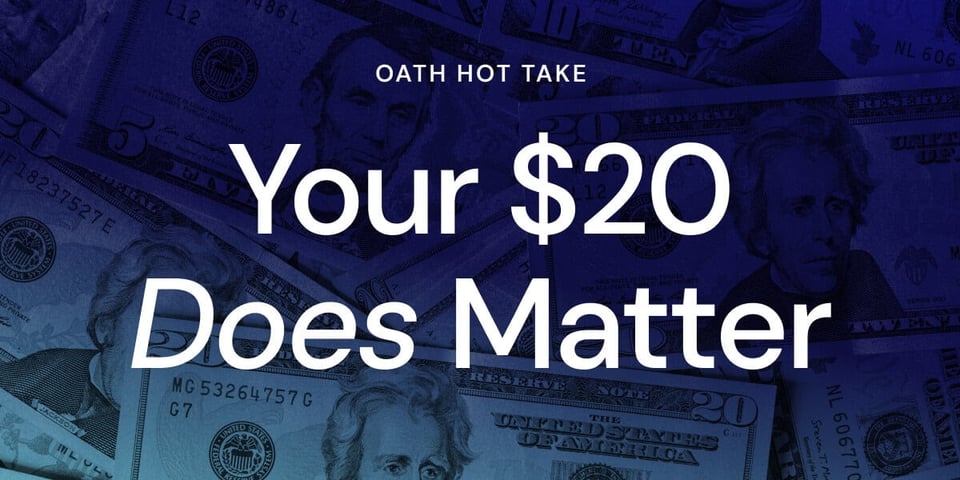
Dear Annette,
Last week, Democrats scored a major victory in Wisconsin defeating Musk to maintain a pro-democracy majority on the top court in the state. In addition to feeling really good to watch Musk lose so publicly, the result could have important implications for the political future of the state and the battle for Congress in 2026.
The race drew a historic level of funding - over $100M total, with Musk personally spending over $20M. These historic sums (the previous record was $56M) have raised a reasonable question among donors: How can my $20 donation matter when someone like Musk can give $20M?
Let me tell you why it does:

It’s true that fundraising affects who wins elections but it does not equally affect all races. We know that additional funding is most effective early in the cycle for candidates with low name recognition. The further downballot you go, the lower the name recognition and therefore greater the influence of money. In contrast, spending hundreds of millions of dollars on high profile races may have little or no additional benefit (past the point of diminishing returns). The goal is funding up to the needed amount for each candidate to run a successful race and not significantly more - that is why Oath’s Impact Score drops when a candidate is fully funded.
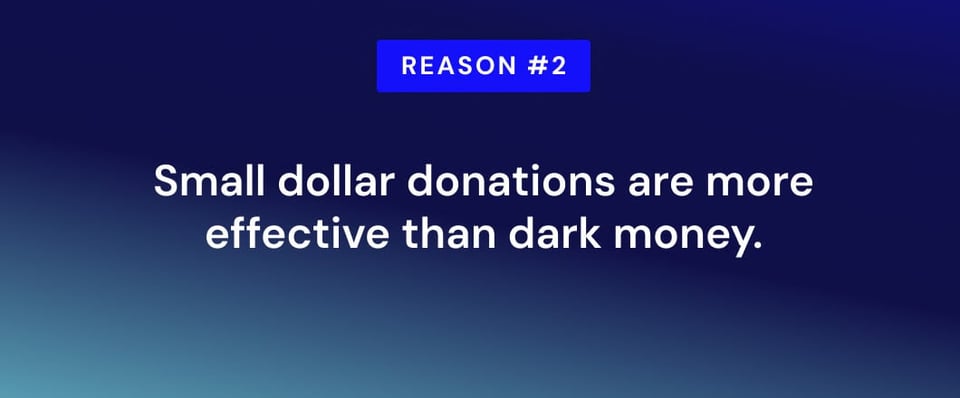
Elon Musk is subject to the same contribution limits as we are. That limit is $20,000 for the Wisconsin Supreme Court and $3,500 per election for federal races. To get around this, billionaires spend through Super PACs which have no limits but are subject to higher prices for advertising and restrictions on messaging. $1M in small dollar donations directly to the candidate is much more impactful than $1M to a super PAC. Susan Crawford outraised the Republican in Wisconsin by 4-to-1 in individual donations which allowed her to hire the best team and run a strong campaign with her own message. The early grassroots support helped her beat the dark money flooding the race late in the game. Our donations made a difference!

Republicans are increasingly reliant on just a few individuals to fund a huge portion of their campaigns. Elon Musk giving hundreds of millions of dollars may help them today but it also creates massive risk. It’s not hard to imagine a Twitter feud changing Musk’s mood, leaving Republican campaign accounts empty across the country. Meanwhile an army of grassroots Democratic donors are giving more strategically than ever before with tools like Oath. A few more wins like Wisconsin could convince Musk to take his ball and go home - what will Republicans do then?
So how do we use this to our advantage? We don’t have to outspend billionaires like Musk if we outsmart them.
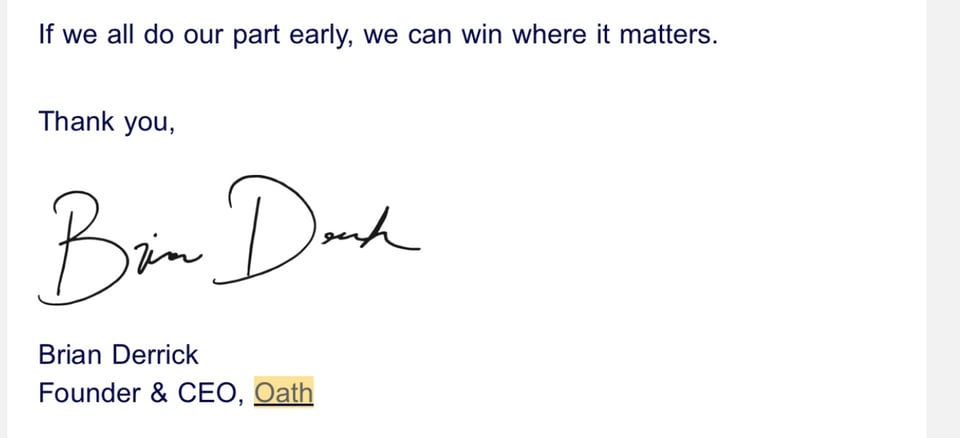
One more thing.
Now is your chance to make sure Abigail Spanberger is elected the next Governor of Virginia. Election Day is November 4, 2025.
Your early donation here will make it happen.